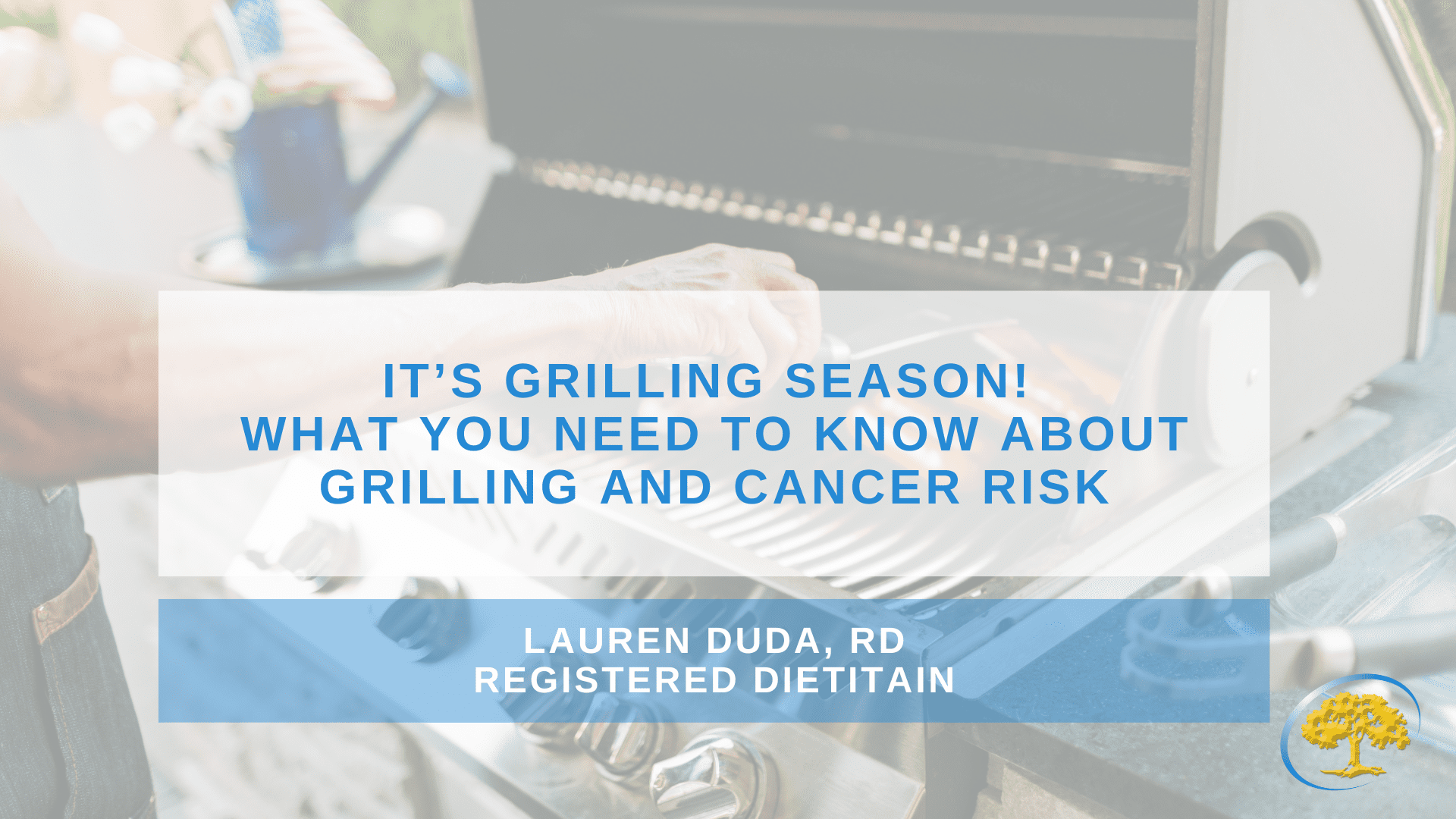
Posted 2 years ago
It’s Grilling Season! What You Need to Know About Grilling and Cancer Risk
Fall is upon us: the weather is beginning to cool down, football season has returned (tailgating!), and families are gathering outdoors once again. BBQs and backyard grilling are a popular past time and a way to bring everyone together. Whether you’re preparing juicy burgers, grilled chicken breast, or colorful vegetable skewers, it is important to consider the method in which you’re grilling your foods. Grilling foods may increase your risk of cancer, specifically colorectal, prostate, and other cancers. Although it can be a healthy alternative to deep frying, it is important to make sure you are grilling in a way that reduces cancer risk for you, your family and your friends. In this month’s blog, we will discuss how to make sure your BBQ is the healthiest it can be.
Grilled Meats and Carcinogens
Cooking meat on the grill and at high temperatures can cause the food to charcoal—therefore, creating and exposing meats to carcinogens.
There are two types of carcinogenic compounds that can be formed:
– HCAs- heterocyclic amines: produced when proteins in the meat react to intense heat. They present in higher amounts the longer meat is grilled.
– PAHs- polycyclic aromatic hydrocarbons: formed from the fat and juices that touch the flame, causing smoke to rise and spread onto the grilled meat. Not only does is coat the food you’re grilling but enters your lungs when inhaled.
Although research does not conclude that these compounds directly lead to cancer, increased exposure can damage and alter DNA and could potentially lead to the development of cancerous tumors. A few factors need to be considered when it comes to grilling and cancer risk: the length of time the meat is exposed to high temperatures, the frequency of grilling, and type of food(s) being grilled.
– Length of time: longer grilling times lead to higher HCA levels, chance of charring, and increased production of smoke.
– Frequency of grilling: grilling occasionally will not have a substantial impact on cancer risk; however, incorporating this cooking method regularly into your lifestyle will increase exposure to HCAs and PAHs.
– Type of food(s): grilling remains a healthier cooking method, for most foods that is. The most popular foods to be grilled, such as red meat (beef and pork), processed meats (hot dogs, sausage), are the biggest culprits of carcinogen production when exposed to high temperatures while cooking. Generally, red meats and processed meats are to be consumed limitedly when following a balanced diet.
How to Cook Safely and Still Enjoy Grilling
I’m at sure at this point, you’re questioning, “should I just kick my grill to curb?” Before you ward off grilling, there is good news: we can still grill AND reduce the exposure to carcinogens and cancer-causing agents. Here are some useful tips on how to be a healthy griller:
1. Pre-cook: reducing the cook time on the grill can be beneficial in reducing the meat’s exposure to high temperatures. Partially cooking meat before by cooking in the oven or on the stove before throwing it on the grill might be something to consider.
2. Placement on grill: cook meats indirectly by placing meats in the center of the grill, avoiding the direct flame or charcoals underneath.
3. Flip or turn frequently: avoid leaving meat to cook on one side for several minutes. By moving frequently, you can reduce the exposure to carcinogens.
4. Marinate: using a marinade that contains vinegar, citrus juice, and herbs can reduce HCA formation on meats. A citrus-based marinade is especially helpful due to the antioxidants in citrus being absorbed into the meat, preventing the chemical effects of cancer-causing agents.
5. Trim fat and burnt pieces: properly trimming the fat prior to cooking can help with reducing smoke and creating a larger flame. After cooking, always cut off the burnt pieces, as this is where HCAs are mostly harbored.
6. Choose wisely: consuming processed meats, including sausage and hot dogs, can increase exposure to carcinogens. Opting for lean animal protein, such as chicken, turkey, fish, and leaner cuts of red meat, can greatly decrease reduce cancer risk.
7. Make it colorful: opting to grill fruits and vegetables can be a guaranteed way to reduce your risk of cancer, not only for their phytochemical content, but also their inability to form carcinogens. Whether it be skewers, grilled pineapple, or even a mix of seasoned vegetables, including fruits and vegetables in your BBQ can reduce cancer risk and be a part of a balanced diet.
Lauren Duda, RD

Lauren’s interest in nutrition peaked at the age of 14, when she experienced a personal journey in developing her relationship with food. She decided that she wanted to help people like herself and educate the general public about nutrition. Becoming a registered dietitian was a clear career path and quickly became a dream of hers at a young age. Throughout the years, Lauren began to realize how necessary nutrition is in the management of disease, especially when witnessing her family members experience major health concerns. With this deepening her desire to care for others, Lauren ultimately knew that it was her goal to provide nutrition therapy in way that also values empathy, compassion, and kindness.
When she’s not working, Lauren loves spending her free time with friends, family, and her dog, Zeppelin. She enjoys listening to music, attending concerts, styling clothes, and hiking/biking during the cooler months.
